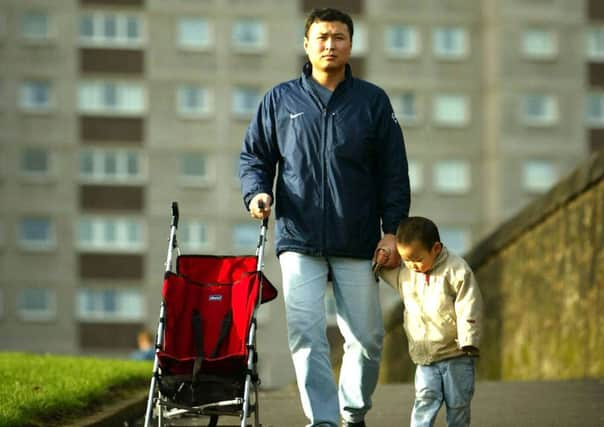Darren '˜Loki' McGarvey: blinded by tribalism '“ time to take look at ourselves


When you take a strong dislike to someone then everything they say or do becomes irritating and suspect. Once you have decided, either due to something you’ve read, something you’ve been told or a direct interaction you’ve had, that you can no longer abide a certain someone, you begin subconsciously building your case against them.
In fact, it might not be a person but a place, institution or even a loose family of ideas or beliefs.
Advertisement
Hide AdAdvertisement
Hide AdNo matter what form the source of your annoyance takes, you will hold it in a progressively lower regard and find common cause with countless others who have arrived at a similar conclusion.
Those who appear to show sympathy, solidarity or support for the subject of your simmering contempt will be exiled from your consideration and re-categorised as mere extensions of the thing you’ve grown to hate.
Last week I saw a striking example of where this kind of dishonest, resentful thinking ends when I attended an additional needs school in the east end of Glasgow.
I was invited there to work with two young boys who were presenting a challenge to youth workers. The boys, both 13-years-old, had been refusing to take part in any of the tasks proposed and, instead, scrawled through their phones during lessons.
To try and build a rapport I firstly asked them to draw out a mind-map – basically a spider-diagram for gathering ideas. Given I didn’t know a lot about these boys I suggested a topic they would have some foreknowledge of: Glasgow, the city in which they live.
“It’s a shite-hole,” said one boy, predictably; the standard response from children of this age and from this kind of area who regard their own communities as dysfunctional, dirty and defective.
“Fulla junkies,” says the other, again, unsurprisingly.
“What else annoys you about Glasgow?” I ask.
“Immigrants” says one, to which the other nods in agreement.
“What is it about immigrants that annoys you?” I ask.
“They come here and take jobs and houses when we have enough homeless people on our streets.”
“They rape people.”
“They shouldn’t be allowed to speak in their own language.”
Advertisement
Hide AdAdvertisement
Hide Ad“If they are running away from a war then maybe they should stay in their own countries and fight?”
“If they hate Britain then why come here?”
“There should be checks to make sure they aren’t aggressive - like we do with Pit-bulls.”
Within two minutes, these normally mute, unresponsive, passive-aggressive boys suddenly sprung to life, politically awakened, and revealed to me an issue they were not only passionate about but, ostensibly, believed themselves to be rather knowledgeable on.
Sadly, at the root of all of this lay the resentment-based thinking I outlined earlier, which worked as a kind of intellectual scaffolding; giving their prejudice the illusion of shape. Their target was pre-determined and, therefore, their reasoning was geared towards producing the result they desired. In this case, that foreigners were making Scotland worse.
Cognitively, however, they were engaged in the exact same process as the rest of us, except these boys had chosen to project that resentment onto a different group – in this case immigrants.
For the rest of us it’s ‘cybernats’, ‘yoons’, ‘tory scum’, ‘MSM’, ‘feminazis’, ‘hacks’, ‘mansplainers’, ‘neds’, ‘Corbynistas’, ‘the middle class’, ‘scroungers’ and so on.
Admittedly, these attitudes may not be as socially unacceptable as racism, but it’s obvious to anyone exercising a modicum of self-awareness, that the process taking place at the level of the brain, and the cultural impact of such thinking, is almost identical – the only difference is we are smart enough to delude ourselves that what we do is far more sophisticated than bigotry.
You can cite whatever reasons you like as evidence it’s not the same; that I am engaging in navel-gazing, pseudo-intellectual nonsense. You can speculate about the true intention behind this line of inquiry and attempt to attribute my words to some other, unseen, motive. You can sneer in the comments section about the low quality of political analysis or discount everything I ever say again, based on one thing I said that you disagreed with.
Advertisement
Hide AdAdvertisement
Hide AdBut all that really proves is that you are not only more stubborn and deluded than you realise, but also, that you have less insight into your own mind and behaviour than two, uneducated, socially excluded 13-year-old bigots from one of the poorest communities in Scotland – who at least knew they were racist.
Whether we blame the SNP, the UK or the Stay Puffed Marshmallow Man for the chaos in which we now live, much of our political reasoning is blind. Like those boys, too many of us have come to believe in the legitimacy of our personal resentments, no matter how dishonest or far-fetched and the cumulative effect has poisoned the well of Scottish life.
We need a new tribe, that does not define itself by adherence to a reductive Yes or No dogma. Because, for every inch our respective political causes are advanced by tribalism, based on overlooking in ourselves that which we so keenly observe in others, then as a country we regress into a cultural delusion no political sovereignty could ever surmount.
In a political and media landscape, full of one-trick ponies and used-car salesmen, that depends on division as a fuel source, there is sadly not much appetite for a conversation that involves turning our ever-so critical eyes inward every now and then.
Then again perhaps, as is often the case, I am gravely mistaken.
